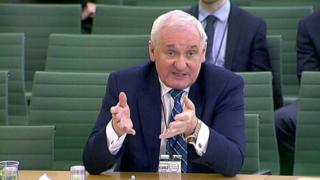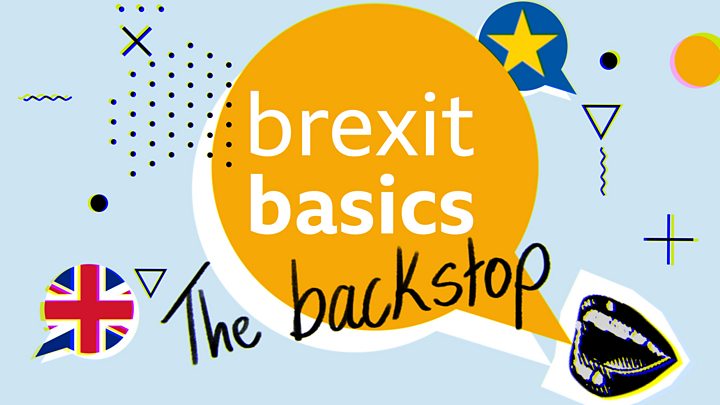
Mr Ahern was one of the architects of the Good Friday Agreement
A former taoiseach (Irish prime minister) has described calls for a border poll in the middle of the Brexit deadlock as “irresponsible”.
Bertie Ahern said the UK’s decision to leave the EU had brought the issue of Irish unity back into focus.
He added that he strongly believed a border poll should not take place for the “foreseeable future”.
Mr Ahern was taoiseach in 1998 and was one of the architects of the Good Friday Agreement.
- A battle for the union?
- Reality Check: Red lines on the Irish border
- ‘Irresponsible’ not to plan border vote
Last week, several cabinet ministers told the BBC a no-deal Brexit could lead to a vote on Irish unification.
Sinn Féin President Mary Lou McDonald has also called on the Irish government to begin planning for a border poll, in the event of a no-deal Brexit.
‘Wrong thing to do’
Appearing before Westminster’s Exiting the EU select committee, Mr Ahern said he believed it should not happen until long after the Stormont assembly began functioning again.
Northern Ireland has been without a functioning devolved government since January 2017, when power sharing collapsed due to a row over a botched renewable energy scheme.
“Until the institutions in Northern Ireland are set up again and functioning for a prolonged period that it would be the wrong thing to do,” he said.
“What I want to see is the Brexit issue dealt with and then the efforts to re-engage the parties on all sides and get the institutions back up and running.
Image copyright
Getty Images
Mr Ahern (centre) was in Belfast last year with other key politicians who played a role in helping create the Good Friday Agreement
“And then, as the provision in the Good Friday Agreement is there that sometime in the future they can have a border poll.
He added: “But bringing a border poll into the middle of this is irresponsible.”
The UK government has said the conditions have not yet been met to facilitate a border poll.
In the Good Friday Agreement – the deal which led to peace in Northern Ireland after decades of violence – it states that the Northern Ireland Secretary must call a border poll if it at any time it appears “likely” to her that a majority of people in Northern Ireland would vote for a united Ireland.
What else did Mr Ahern say?
He was quizzed by MPs about the state of the Brexit negotiations and his views on how the Irish government is handling its side of the talks.
He told them there was “no possibility” of the Irish government agreeing that the backstop – the insurance policy in the withdrawal agreement to avoid a hard Irish border – can be time limited.
“There is no hope of that,” he said.
The Irish government and EU have said there can be no re-negotiation of the withdrawal agreement.
He said he did not believe it was impossible that technology might eventually exist that could maintain a seamless border and remove the need for the backstop, but that in two years of negotiations, it had not yet been invented.
Image copyright
Maxwell Photography
The current Taoiseach Leo Varadkar and Theresa May had dinner together in London last week
“It seems to me in the transition period it must be possible to work out an arrangement that means the backstop isn’t necessary… but right now all the brain power says that’s what we should do” in absence of anything else, he added.
The former taoiseach also said it was an “awful pity” that 45 years of improved relations between UK and the Republic of Ireland through EU membership “dies” with Brexit.
He suggests the British and Irish prime ministers should meet twice a year, while other ministers and officials should meet regularly and keep up communications through the likes of the British-Irish Council.
What is happening with the backstop?
It is the insurance policy to maintain an open border between Northern Ireland and the Republic of Ireland unless and until another solution is found.
The UK and EU made a commitment to avoid physical barriers or checks on the border if no UK-EU trade deal is agreed before the Brexit transition period ends.
Many people are concerned that the return of such checks would put the peace process at risk.

But there has been opposition to the backstop from the DUP and Brexiteer MPs, who believe its terms could keep the UK tied to EU rules in the long term.
Last month, MPs backed an amendment in Parliament calling for “alternative arrangements” to replace the backstop.
A group of Conservative MPs has held talks aimed at finding other Brexit options that would avoid a hard border.
What happens next?
The Brexit Secretary Stephen Barclay has played down a report that Theresa May could force MPs to choose between backing her deal or accepting a delay to EU withdrawal.
The government is committed to Britain leaving the EU on 29 March, he added.
His comments come after Theresa May set out plans to bypass Commons rules, in order to get a Brexit deal ratified in time.
Theresa May and EU leaders will also meet again before the end of February for more talks.
The prime minister is expected to put the deal to a vote in the Commons towards the end of February.
She said the plan must change if it is to win the support of MPs who urged her to seek “alternative arrangements” to the backstop when rejecting the deal last month.
Brexit: Call for Irish border poll during deadlock ‘irresponsible’


